WR For Italy In Men’s Medley Relay; Kliment Kolesnikov Goes Second All-Time In 50 Back at Euro Champs
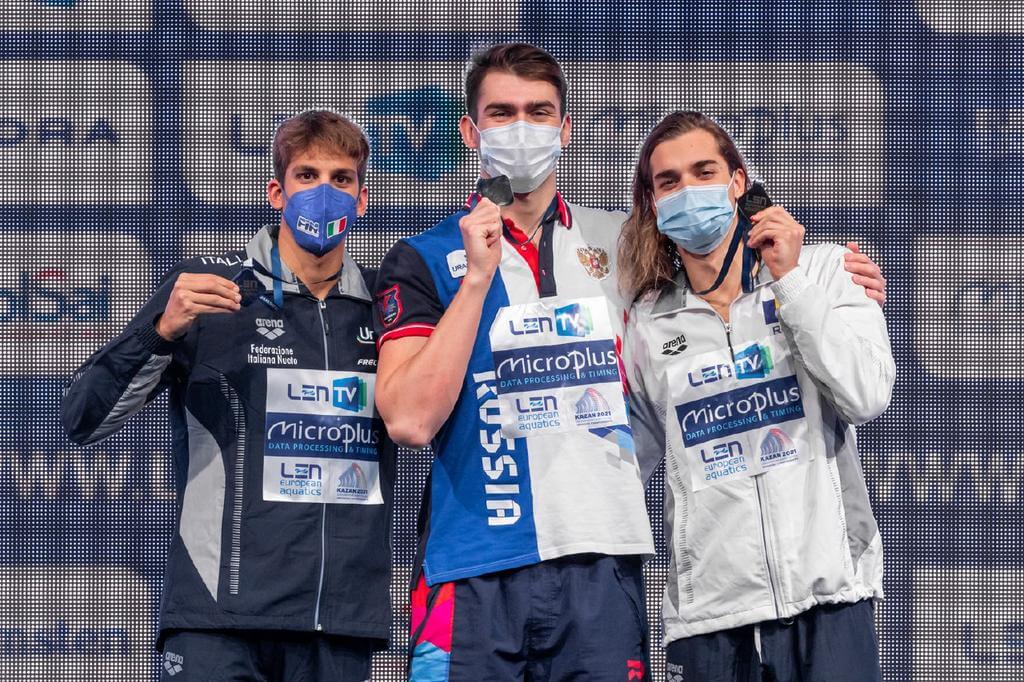
WR For Italy In Men’s Medley Relay; Kliment Kolesnikov Goes Second All-Time In 50 Back at Euro Champs
Italy set a world record in the men’s 4x50m medley relay and Kliment Kolesnikov produced the second-fastest 50 backstroke in history in a championship mark of 22.47 on day two of the European Short-Course Championships in Kazan, Russia.
Michele Lamberti led off the historic Italian quartet and won silvers in the 50 back and 100 fly as he marked a very special 21st birthday.
Sarah Sjostrom won the 5o free in a championship record of 23.12, a time only she and world record-holder Ranomi Kromowidjojo have bettered and Ilya Shymanovich swam the third-swiftest 100 breaststroke in history to set up what is looking an absolute thriller of a final.
The Italian quartet of Michele Lamberti (22.62), Nicolo Martinenghi (25.14), Marco Orsi (22.17) and Lorenzo Zazzeri – with a scorching freestyle leg of 20.21 – set a global standard of 1:30.14 to cut 0.30 off the previous record set by Russia in 2017.
Russia were second in 1:30.79 with the Netherlands winning bronze in 1:32.16, a national mark which consigns another super-suited record to history by eclipsing the 1:32.94 that had stood since December 2009.
Kolesnikov Moves Closer To Manaudou’s World Record
Kolesnikov had looked ominous in the semis with a new championship and Russian mark of 22.57 in the semis on day one to go within 0.35 of Florent Manaudou‘s world record of 22.22 that has stood since the 2014 World Short-Course Championships in Doha.
The double Tokyo medallist already holds the long-course 50 back record with a time of 23.80 from the European Championships in Budapest.
It was Lamberti who turned first only for Kolesnikov to surface ahead and forge his way to the wall in 22.47, thereby lowering his own national and championship record.
Lamberti was second in 22.65 – an Italian record – with Robert Glinta third in 22.74 for a Romanian mark.
All-Time
22.22: Florent Manaudou, 2014 World SC Championships
22.47: Kliment Kolesnikov, 2021 European SC Championships
22.54: Ryan Murphy, 2020 International Swimming League
22.55: Guilherme Guido, 2019 International Swimming League
22.58: Evgeny Rylov, 2018 World SC Championships
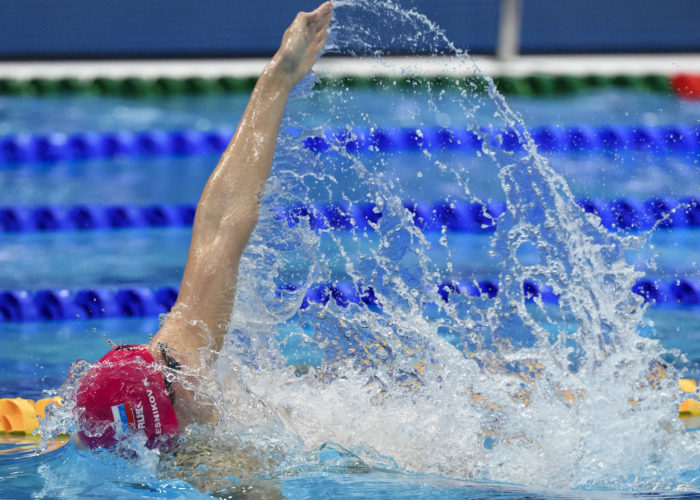
Photo Courtesy: Deepbluemedia/Insidefoto
Kolesnikov said:
“I’m always happy when I am standing on the podium.
“I had a lost of tasks to do and during my races I want to do my best – and winning this race wasn’t a surprise for me.
“In this event I usually have a competition with myself and not with the other guys.”
It would prove to be the first of three medals for Lamberti whose father Giorgio won three medals, including 200 free gold, at the 1991 World Championships in Perth, Australia.
Lamberti said:
“I’m very satisfied. Before the race I couldn’t believe I could swim this fast.
“I mean, up until recently Kolesnikov was almost out of reach, I still have a lot to work on and correct many things.
“I’m continuing my family traditions as an athlete and as a swimmer. My parents are very happy for my successes but never felt any pressure. I train and swim because I truly like it.”
Glinta said:
“Of course, I’m really happy. I shaved only for the finals so I knew I had a lot more in me than in the semis.
“This is a new personal best for me and a new national record. It is more than I could have asked for. Overall, I’m extremely happy with this.”
Sarah Sjostrom Powers To Gold
The Swede won this title once before in Copenhagen in 2017 and her power off the wall and strength had helped secure lane four with Katarzyna Wasick alongside her, Sjostrom just 0.07 off her 2017 championship record in 23.37.
The yellow hat of Sjostrom forged down the second 25, coming away from the field, to touch first a half body-length ahead in a new championship record of 23.12.
Wasick was second in 23.49 and defending champion Maria Kameneva took third in 23.72.
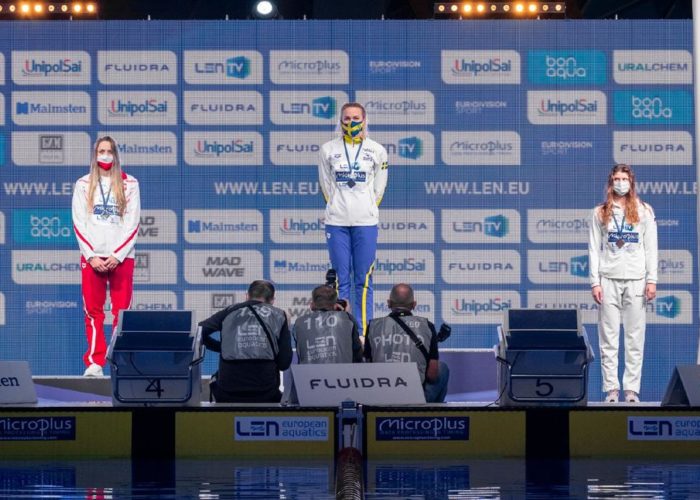
Sarah Sjostrom: Photo Courtesy: Deepbluemedia
It was the fifth-fastest time in history and the Swede’s third quickest with Ranomi Kromowidjojo sitting atop the all-time rankings in 22.93.
Sjostrom had to endure a turbulent year with her Olympic participation threatened when she fractured her elbow in February and subsequently underwent surgery.
Despite that she won silver in the 50 free in Tokyo and said on Wednesday:
“It was a tough year, I’m really surprised with my best time of this season which is also a championship record.
“This is a great thing for me, I never thought I would be back this fast.
“After the Olympics, I took three weeks of a kind of break as because of my injury, I couldn’t afford to stop with everything.
“It’s a great way to start this championship.”
Wasick said:
“This season is just beginning and I’m happy that I’m staying fit and showing results. I have a lot of meets ahead and I hope I can continue like this.
“This is my first individual medal in short-course and I’m very happy for myself and also for Team Poland.”
Kirpichnikova Dominates For Russian 800 Free Record
Anastasiya Kirpichnikova had set a Russian record of 8:08.44 on day one to book lane four.
In the final she went out like a rocket and was two seconds ahead of defending champion Simona Quadarella after 200m and notably 0.76 inside Mireia Belmonte‘s European record of 7:59.34 which has stood since 2013.
The Russian extended her lead to almost four body lengths by halfway with Quadarella and Isabel Gose battling it out behind her.
By 600, Kirpichnikova’s lead was almost five seconds with Quadarella slightly edging the German but Gose was sitting on her shoulder and waiting to pounce.
There was no doubt who would win but more a question of whether the Russian would beat Alessia Filippi’s championship record of 8:04.53 from the super-suited 2008 edition in Rijeka, Croatia.
Ultimately she fell just 0.12 short in 8:04.65, a new Russian record, and a performance of some real dominance.
Quadarella and Gose were neck and neck coming off the final turn but the Italian inched ahead to take silver in 8:10.54 to the German’s 8:10.60.
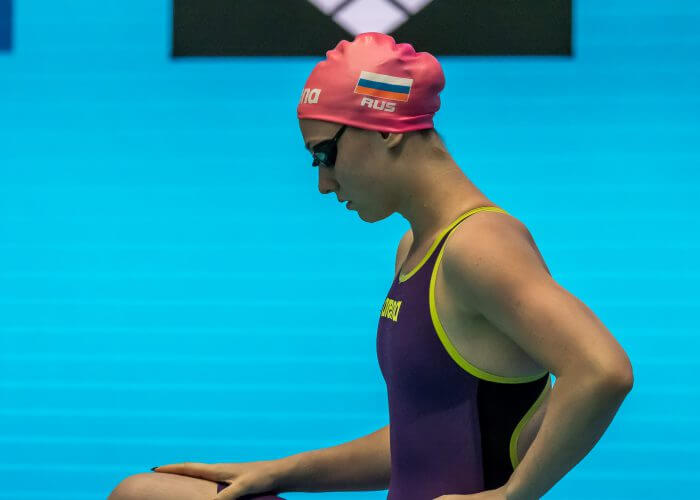
Anastasia Kirpichnikova; Photo Courtesy: Peter H. Bick
Kirpichnikova said:
“I was ready to make more since the new world record is just five seconds away. I thought everything would be clicking and it did, I’m really happy with this result.”
Quadarella said:
“This silver means a lot to me. This is my second best time and very close to my PB. It was really good, it is my first European silver.
“The last 100m were really fast and tried to give my maximum as I’m not yet in my best condition.”
Gose added:
“I’m very happy, this is the fastest I’ve ever swum. Yesterday I already clocked my best but today is six seconds better.
“It was a really good race between Simona and me. She is the world champion so my coach told me to go with her and maybe you can catch here. It was really close at the end but I’m really happy with this medal.”
Szabo Flies To The Top Of The Podium
Kristof Milak came eighth in the 50 back – his first international short-course final – and returned for the 100 fly where he occupied lane four following a semi swim of 49.71.
None of the medallists from Glasgow 2019 were competing so a whole new podium was waiting to be crowned.
Jakub Majerski led at halfway in 22.79 and the final 25 came down to a sprint for the wall which was won by a Hungarian – but in the form of Szebasztian Szabo in 49.68.
Lamberti – who had returned to the pool minutes after the 50 back victory ceremony – was second in 49.79 ahead of Majerski (49.86).
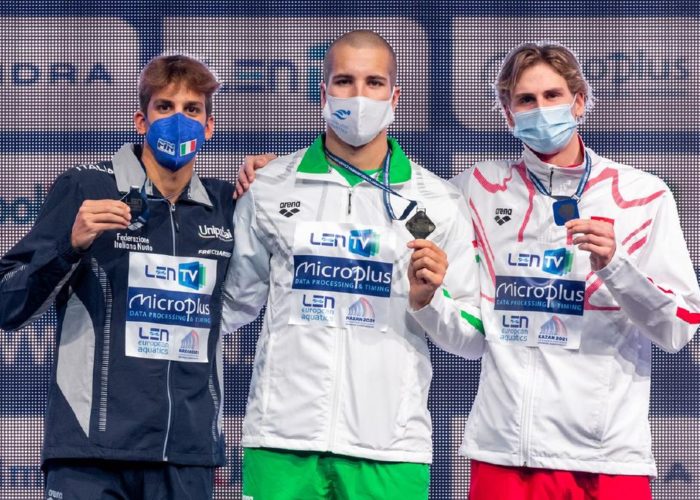
Men’s 100 fly podium, Kazan: Photo Courtesy: Deepbluemedia
Milak was locked out of the podium by one place and 0.02 in 49.88 after leaving himself too much to do.
Szabo said:
“Had I stood up for only this race today, I would have expected a medal if not more from myself.
“But if you have more swims, somehow it gets to your head that you may be tired to do it really good.
“So after the 50m free semis I was like, OK, just go for it, no matter which place you get.
“When I saw at 150m that I was still around then I tried to push as hard as possible as I knew they were coming fast in the last leg, especially Kristof (Milak).
“I’m just happy that I was able to come up with one of the better ones. The top finish in the dash was definitely a booster.”
For Lamberti it was the second medal of the day and he said:
“I’m very happy for both silver medals today. They were unexpected in a way.
“I knew I had to give all to make a mark here. This one was a bit more difficult, 100 fly, my sixth race here.
“I’m also happy to break the 50sec barrier, this is my personal best. I plan to celebrate my birthday and the medals with my closest friends.”
Carraro Comes Through
Experience was key as Carraro came through on the final 25 to overhaul Eneli Jefimova and defend her 100m breaststroke title in 1:04.01.
Jefimova won three medals, including 100br gold, at the European Juniors in Rome and at just 14 is a very exciting prospect.
She clocked 1:04.25 to tie for second with Evgeniia Chikunova who came from seventh at halfway.
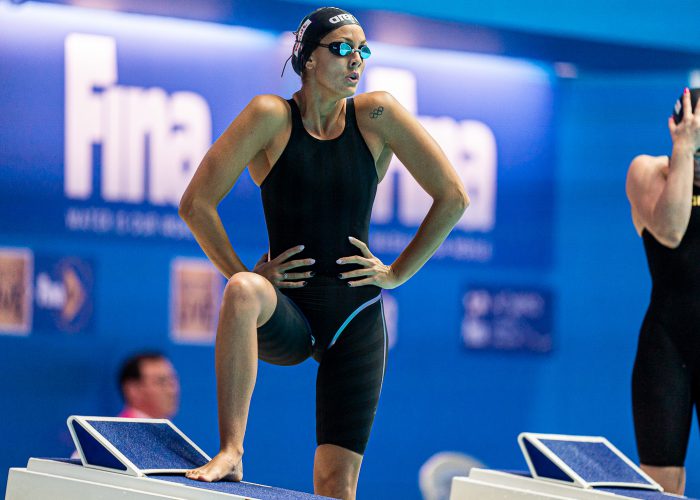
Martina Carraro: Photo Courtesy: Becca Wyant
Carraro said:
“I wanted to repeat the success from Glasgow 2019, but I wasn’t sure. I’m very tired, it’s been a long, very demanding year for me.
“But I focused what it was the most important, it takes both head and heart to win.
“But I love racing and love training, this is my job and truly enjoy what I do. I’m really proud.”
Jefimova was almost in tears and said:
“I am so happy, I cannot believe this. This is a big surprise for me, I wasn’t expecting to get a medal at all. I’m only 14 years old!
“I’m just so happy, I’m just going through too many emotions now.”
Chikunova said:
“I’m happy that I bettered my personal best. I thought of the gold medal but it’s also a good result.
“I will do my best in this distance though I need to improve my start.”
Men’s 100 Breaststroke Semis: Ilya Shymanovich Rattles World Record
This promised to be a real tussle to book the centre lanes for the final with Shymanovich lining up with Arno Kamminga and Nicolo Martinenghi – the Olympic silver and bronze medallists respectively.
All three medallists from 2019 – Kamminga, Shymanovich and Fabio Scozzoli – lined up for the second semi after witnessing Martinenghi take the first in 56.54, slower than his heat time.
Shymanovich was just 0.01 off his own world record at halfway and he was within touching distance of the black line coming down the final metres.
The Belarus swimmer touched in 55.45 – the third-fastest time in history and one bettered only by his own global mark of 55.34 and Adam Peaty‘s 55.41.
Kamminga had a scorching final 25 to equal his Dutch record of 55.82 with Emre Sakci third through in 56.47, one place ahead of Martinenghi.
Men’s 50 Free Semis: Szabo Sizzles
Defending champion Vlad Morozov set the tone in the first semi when he got the touch in 20.98 with Netherlands duo Thom de Boer and Jesse Puts tying for second in 21.00.
The second semi saw Szebasztian Szabo clock 20.87 ahead of Pawel Juraszek (20.87) as the pair booked the centre lanes for Thursday’s final.
Lorenzo Zazzeri and fellow Italian Marco Orsi progressed with Heiko Gigler rounding out the qualifiers in 21.33.
Women’s 200 Fly Semis: Chimrova On Pole
Svetlana Chimrova was quickest through from the heats and she was second at halfway of the semi number two, 0.11 behind Angelina Koehler.
The Russian accelerated on the fifth length and put clear daylight between herself and the rest of the field to clock the fastest time in 2:05.52.
Helena Rosendahl Bach, winner of the first semi in 2:06.12, was second through with 2019 silver medallist Ilaria Bianchi progressing.
Lana Pudar, who doesn’t turn 16 until January, was fourth through in 2:07.10 with Zsuzsanna Jakabos, who won bronze in Glasgow two years ago, next swiftest.
Women’s 200 Back Semis: Kira Toussaint Leads The Way
Defending champion Margherita Panziera went 2:04.53 in the first heat and the second semi saw Kira Toussaint dominate from the off to win in 2:03.90 and book lane four alongside the Italian.
Lena Grabowski (2:05.42) was third through in an Austrian record with Laura Bernat, who turned 16 in September, progressing in fourth.
Women’s 100IM Semis: Sjostrom Once More
A new champion will be crowned in the absence of Katinka Hosszu and it was Sjostrom who led the field in 57.92.
Marrit Steenbergen was second through in 58.41 with Maria Ugolkova equalling her Swiss record of 58.47 that she set last week at the World Cup in the very same pool.



